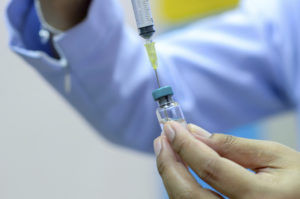Addressing your concerns about the COVID vaccine and fertility
 It seems like you can’t go anywhere on the internet without hearing about the coronavirus vaccine. Since the vaccine became available, people have had questions about it. For women and men who want to have children, one of these questions is about the link between the COVID vaccine and fertility. Can getting vaccinated for COVID cause infertility?
It seems like you can’t go anywhere on the internet without hearing about the coronavirus vaccine. Since the vaccine became available, people have had questions about it. For women and men who want to have children, one of these questions is about the link between the COVID vaccine and fertility. Can getting vaccinated for COVID cause infertility?
The answer to this question is no, and the Austin fertility specialists at Texas Fertility Center are here to explain why.
Is there a link between the COVID vaccine and fertility?
You’ve probably heard reports that some people have been reluctant to get the COVID vaccine due to concerns about its effect on fertility. However, there is no evidence that getting the vaccine will cause infertility.
The COVID vaccine works by encouraging the body to make copies of the coronavirus spike protein. Doing so teaches the immune system how to fight this specific protein and the virus itself. This process doesn’t relate to fertility, so how did the rumor about the COVID vaccine and fertility issues get started?
It all started with a false report on social media. The report claimed that the spike protein on the coronavirus is the same as another protein (syncitin-1) that affects the growth and attachment of the placenta. The false report claimed that getting the vaccine would cause a woman’s body to fight syncitin-1 and harm the placenta.
However, the syncitin-1 and the coronavirus spike protein are different. As a result, there’s no evidence that getting the coronavirus vaccine will harm a woman’s placenta or her fertility.
One more thing to consider about the coronavirus vaccine
Pregnant women are more likely than non-pregnant women to experience severe illness due to COVID. The coronavirus can also increase the risk of other adverse outcomes, including preterm delivery, which means giving birth before 37 weeks of gestation.
Due to the dangers of COVID, our Austin fertility specialists and the American Society for Reproductive Medicine (ASRM) still recommend getting the COVID vaccine if you are planning to conceive or thinking about starting fertility treatments, or if you’re pregnant or breastfeeding.
If you have additional questions about the COVID vaccine and fertility, contact us to schedule an appointment. Our Austin fertility specialists can help you understand the latest guidance about the coronavirus.














Comments are closed.